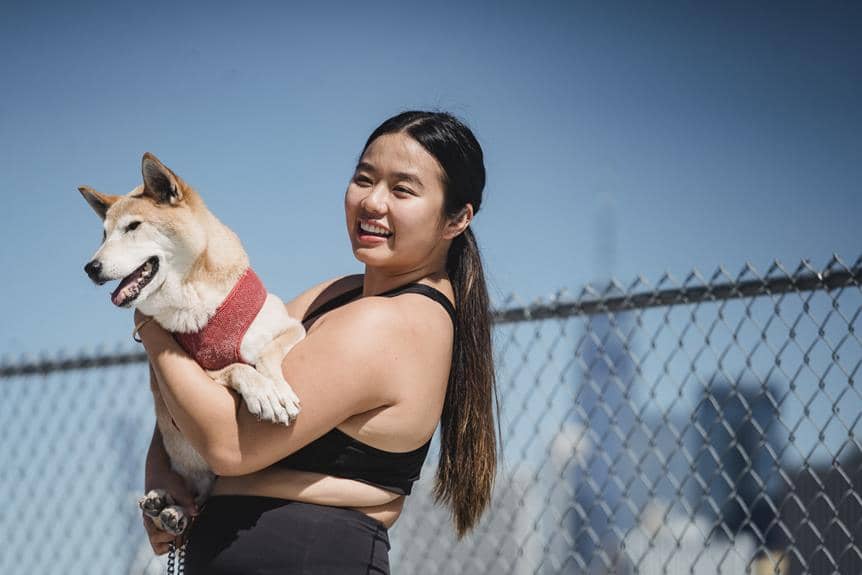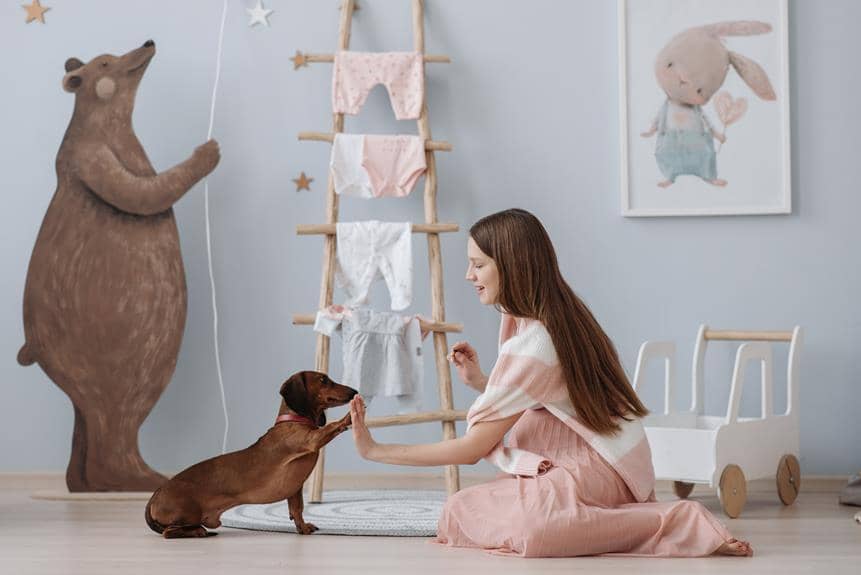
Did you know that raising a puppy can be tough? And when do puppies get easier?
Well, we’re here to tell you that it does get easier! In this article, we’ll explore the different stages of puppyhood and provide some insights on when you can expect things to become a bit smoother.
From the newborn stage to the teething phase and all the way to adulthood, we’ll share tips and tricks to help you navigate this adorable but challenging journey with your furry friend.
Table of Contents
Key Takeaways
- Puppies become easier to handle and care for as they transition from the newborn stage to the socialization period.
- Proper socialization from an early age is crucial for puppies to build confidence and reduce fear.
- The teething phase can be challenging, but providing appropriate chew toys can help alleviate discomfort and prevent destructive chewing.
- Adolescent dogs may exhibit mood swings and test boundaries, but regular exercise, mental stimulation, and continued socialization can help prevent destructive behavior and ensure a well-socialized dog.
The Newborn Stage
We’re still determining how long the newborn stage lasts for puppies, but we’re excited to learn more about it.
The newborn stage is a significant and delicate time in a puppy’s life. During this stage, puppies depend entirely on their mother for nourishment and care. They’re born blind, deaf, and unable to regulate their body temperature, so they rely on their mother to provide warmth and milk.
It’s a time of rapid growth and development as the puppies gradually gain weight and their senses develop. They spend most of their time sleeping and eating, and their world is limited to the whelping box and their mother’s comforting presence.
As they age, their eyes and ears open, and they move around more. This stage is crucial for bonding with their mother and littermates and getting a solid start in life.
Although we’re unsure how long this stage lasts, we know it’s a precious and fleeting time for these adorable little creatures. We can’t wait to explore more about this fascinating stage of puppyhood.
The Socialization Period
As we’re discussing the socialization period, exposing puppies to various people, animals, and environments is crucial to helping them develop into well-adjusted adult dogs. During this vital stage, there are a few key things to keep in mind:
- Positive experiences: Introducing puppies to new situations positively and gently can help them build confidence and reduce fear. Whether meeting friendly strangers, encountering different types of animals, or exploring new places, creating positive experiences is essential.
- Proper socialization: It’s important to expose puppies to various individuals, including children, men, women, and people with different appearances and voices. This helps them become comfortable around diverse groups of people and reduces the likelihood of fear or aggression towards specific individuals.
- Gradual exposure: While exposing puppies to new things is essential, it’s equally important to do so gradually. Gradual exposure allows them to adjust at their own pace, preventing overwhelming situations that could lead to fear or anxiety.
- Continued socialization: Socialization shouldn’t stop after the initial few months. Continuing to expose puppies to new experiences throughout their lives helps maintain their social skills and adaptability.
The Teething Phase
During the teething phase, we’ll need to provide appropriate chew toys to help alleviate any discomfort and prevent destructive chewing behavior. Teething is a natural process that all puppies go through, usually starting around three to four months of age and lasting until they’re six to eight months old. Just like human babies, puppies experience discomfort and pain as their baby teeth fall out and their adult teeth enter.
Providing them with chew toys helps soothe their sore gums and redirects their chewing behavior away from our furniture and belongings.
When selecting chew toys for our puppies, choosing ones specifically designed for teething is important. These toys are usually rubber or nylon, durable, and safe for puppies to chew on. Avoid giving them toys that are too hard or small, as they can be a choking hazard. It’s also a good idea to have a variety of textures and shapes to keep our puppies engaged and interested.
Additionally, we should regularly inspect our puppy’s chew toys for any signs of wear and tear. If a toy becomes damaged or starts to break apart, we should immediately replace it to prevent our puppy from accidentally swallowing small pieces.
The Adolescent Stage
We’ll face challenges and rewards in the adolescent stage as our puppies grow and develop into adult dogs. It’s an exciting time as we witness their transformation and see glimpses of the well-behaved, well-adjusted dogs they’ll become. However, it can also be a challenging phase that requires patience and consistency.
Here are some key aspects to consider during this stage:
- Hormonal changes: Like teenagers, adolescent dogs experience hormonal changes that can cause mood swings and behavioral issues. It’s important to stay calm and provide consistent training to help them navigate these changes.
- Testing boundaries: In adolescence, puppies test boundaries and push limits. They may become more independent and stubborn, requiring firm, gentle guidance to establish rules and boundaries.
- Energy levels: Adolescent dogs have a lot of energy and may become more active and excitable. Regular exercise and mental stimulation are crucial during this stage to prevent boredom and destructive behavior.
- Socialization: Continued socialization is vital during adolescence to ensure our puppies become well-socialized and friendly dogs. Exposure to different environments, people, and other animals will help them develop good social skills.
As we navigate the challenges of the adolescent stage, it’s important to remember that with patience, consistency, and love, our puppies will grow into well-rounded, well-behaved adult dogs.
The Adult Dog Years
We’re now entering the adult dog years, and it’s fascinating to see how our puppies have grown and matured. It feels like just yesterday; they were tiny and full of boundless energy. But now, they’ve transformed into well-behaved companions who bring us joy.
We’ve noticed a significant change in our puppies’ behavior during the adult dog years. They’ve become more calm and settled, with a better understanding of our expectations and routines. They no longer chew on everything in sight or have accidents in the house. Instead, they’ve developed good habits and are fully house-trained.
They have become more obedient, and their physical appearance has also changed. They’ve grown in size, and their features have become more defined. The transformation from a clumsy puppy to a graceful adult dog is fantastic.
In addition to their physical and behavioral changes, our puppies have also developed a deeper bond with us. They’re more affectionate and attentive, always seeking our attention and wanting to be by our side. It’s heartwarming to see how much they love and rely on us.
As we enter the adult dog years, we can’t help but feel proud of our puppies’ growth and development. They’ve come a long way from their mischievous puppy days and have become our loyal and loving companions. We look forward to creating more memories and adventures together in the future.
Frequently Asked Questions
How Long Does the Newborn Stage Usually Last for Puppies?
The newborn stage for puppies usually lasts for a few weeks. During this time, they depend entirely on their mother for nourishment and care. It is an essential period of growth and development.
What Are Some Common Challenges That Puppy Owners Face During the Socialization Period?
During socialization, puppy owners often encounter challenges like potty training, biting, and separation anxiety. These obstacles can be frustrating, but they become easier to manage over time with patience, consistency, and proper training.
What Are Some Effective Strategies for Managing Teething in Puppies?
Teething in puppies can be challenging, but there are effective strategies to manage it. Providing appropriate chew toys frozen treats, and redirecting their attention can help alleviate discomfort and prevent destructive chewing behavior.
How Long Does the Adolescent Stage Typically Last for Puppies?
Adolescence in puppies is like a stormy sea. It’s a challenging phase that can last up to a year. But fear not, with patience and consistency, we can navigate through it and reach calmer waters.
What Common Health Concerns Should Dog Owners Encounter During the Adult Dog Years?
Some common health concerns dog owners may encounter during the adult dog years include arthritis, dental issues, and obesity. Maintaining regular vet check-ups and a healthy lifestyle for our furry friends is essential.
Conclusion
So, when do puppies get easier?
Well, I hate to burst your bubble, but the sad truth is, they never really do.
Sure, they might outgrow the teething phase and the occasional accident on the carpet.
But when you think you’ve figured it out, they hit the adolescent stage and turn into rebellious little furballs.
And let’s wait to get started on the adult dog years.
So, buckle up, folks, because the puppy chaos is here to stay!








Leave a Reply
You must be logged in to post a comment.